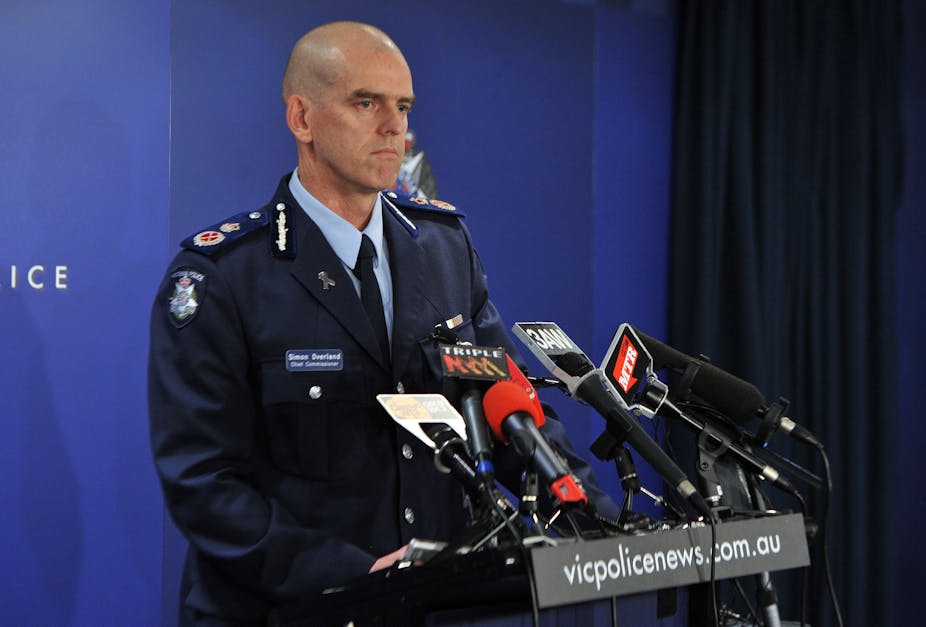The surprise at the speed of yesterday’s political events in Victoria, culminating in the Premier’s resignation, was neatly encapsulated by investigative journalist Melissa Fyfe on Twitter: “You go for a beer and the premier of Victoria changes. Amazing.”
Lingering political questions
If Liberal MP Geoff Shaw left the party because of problems with the former premier, will he now try to return? If he does, will the party let him? If not, a refusal would suggest that the tapes released by the Herald Sun earlier this week were the party’s primary concern, and that Shaw’s leaving the party may simply have exacerbated internal tensions and accelerated the process.
As for the tapes themselves, allegations made against Deputy Premier Peter Ryan by his former police adviser Tristan Weston are serious. Regarding matters surrounding the resignation of Commissioner Simon Overland, Weston is heard saying to the Premier’s chief of staff Tony Nutt:
“I can’t put any sugar on it. Peter is a liar. Peter lied to the OPI, Peter lied to the Parliament and he’s lied, he’s continuing to lie about what he did and didn’t know.” (Source: www.heraldsun.com.au)
Is this just a disgruntled ex-adviser? Did Deputy Premier Ryan in fact lie about what he knew? Either way, people are waiting for more answers and Ryan is likely to find himself under increasing pressure.
Lasting policy problems
In establishing Victoria’s Independent Broad-based Anti-corruption Commission (IBAC), the Baillieu government restricted the organisation such that it could only investigate serious corruption, and only when it had evidence of an indictable offence.
Former Supreme Court judge Tim Smith, QC, has been a vocal critic of IBAC’s constrained scope and high evidentiary threshold. These and similar concerns were joined earlier this week by those of former Court of Appeal judge Stephen Charles, QC, who had chaired the government’s panel on IBAC.

Concerns over the rationale for constraining IBAC haven’t been helped by now public comments from Mr Nutt that the government specifically designed the IBAC legislation to avoid what he alleges was “cowboy, Stasi, bizarre, no judgment, just-fit-people-up” behaviour on the part of IBAC’s predecessor, the Office of Police Integrity (the allegations have been hotly contested as “an outrageous slur” by former OPI director Michael Strong).
The government’s claim that Victorian Ombudsman George Brouwer would be left to look into cases of non-serious corruption and misconduct became clouded by further criticism. In November 2012, when the Ombudsman himself raised concerns that the new system would “constrain and compromise the functions of an independent ombudsman for Victoria”.
By the book
On paper, Baillieu did what was meant to be done under the new anti-corruption system. He referred allegations of possible misconduct or corruption to IBAC. The government had previously outlined that IBAC could function as a clearing house for complaints, referring cases to the ombudsman if and as necessary. In context of the past and ongoing debate about IBAC, and the tapes released earlier this week, however, things weren’t so neat.
IBAC had been specifically designed to only investigate cases of corruption that are considered to be serious. In Nutt’s words, to avoid besmirching reputations on the basis of allegations, “we’re going to have all sorts of supervising mechanisms so that they’re not unchecked and rampaging around the place”. When asked on 3AW if he believed this was a case of serious corruption, the Premier replied that he did not. Yet Mr Baillieu was referring the case to IBAC.
Even though the government had previously maintained that IBAC could work as a clearing house, this risked looking like handballing the problem to an organisation that - in light of already canvassed and widely voiced concerns about its scope and powers - might not even be able to investigate the matter. In theory, if IBAC determines that there is insufficient evidence of an indictable offence, and/or that there is no serious corruption, then they will not investigate the matter (this may yet be a very high profile test case to see how well the institution functions).
Baillieu made clear in the same interview that should IBAC be unable to investigate, it had the power to in turn refer matters to other investigative bodies if necessary. Through true and appropriate under Victoria’s new anti-corruption regime, this doesn’t do much to dispel any sense among critics - whether inside or outside the party - that the problem is being kicked around instead of addressed directly.
IBAC - dead before it was born?
The last few days have left Victorians with reason to worry that they have an anti-corruption system which, even when used as intended, can fuel concerns about the legitimacy or likelihood of investigations or the motivation of a Premier that refers a matter to the chief anti-corruption body.
Unless the perceptions and realities of the problems with IBAC are addressed, these events (and any others like them) are likely to do little to garner public support or confidence in IBAC, regardless of the good intentions and hard work of IBAC staff.
Regardless of what happens in the next few days, and even if there turns out to be no more to the story behind the tapes released by the Herald Sun than we already know, the events as they stand highlight the importance of the new premier taking steps to address lingering doubts and concerns over the ability of IBAC to do what it needs to do.

